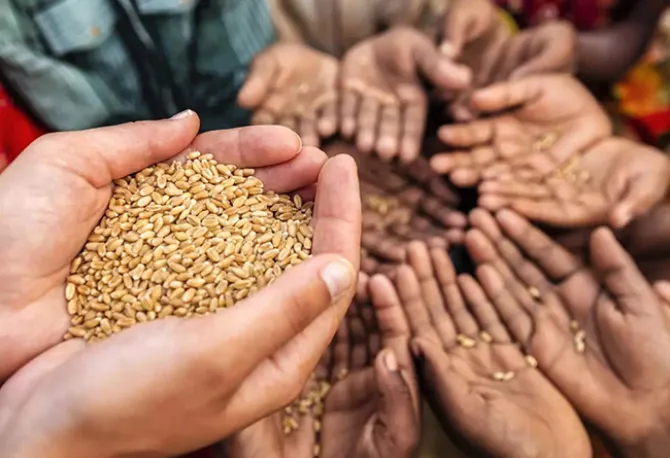
Food security and sustainable development are pressing global concerns, particularly in the Indo-Pacific region, where a growing population, changing climate patterns, and socio-economic disparities pose significant challenges. The Indo-Pacific, encompassing a vast expanse of land and ocean, is characterised by its burgeoning population, intricate geopolitics, and dynamic ecosystems. In this diverse region, food security and sustainable development have emerged as paramount concerns, reflecting a confluence of factors such as rapid population growth, climate change, economic disparities, and environmental degradation. The region is home to more than half of the world's population, with numbers projected to increase significantly in the coming decades. This rapid population growth places immense pressure on food resources. Rising temperatures, changing rainfall patterns, and the increasing frequency of extreme weather events disrupt agricultural activities and threaten crop yields. Prolonged droughts, devastating floods, and cyclones can result in crop failures and damage to critical infrastructure, further exacerbating food security challenges. Environmental degradation is rampant in the region, driven by deforestation, habitat loss, overfishing, and pollution. These activities compromise the health of ecosystems and biodiversity, affecting the availability of natural resources required for food production and human sustenance. Water scarcity is a growing concern in the region, impacting both agricultural and non-agricultural sectors.
Environmental degradation is rampant in the region, driven by deforestation, habitat loss, overfishing, and pollution.
Malnutrition, characterised by undernutrition and diet-related diseases, remains a significant concern in the Indo-Pacific. While some populations struggle to meet their caloric needs, others face the dual burden of undernutrition and the rising tide of obesity and non-communicable diseases. Efforts to reduce hunger in the Indo-Pacific have been slowing down over the past few years, with undernourishment increasing by 26 million people in 2020 and 2021. In 2021, the region had 396 million people living without enough food, with the majority (331.6 million people) in Southern Asia. According to the Food and Agriculture Organisation (FAO) 2022 report, about 460 million people in the region were living with severe food insecurity, while another 586 million were living with moderate food insecurity. The prevalence of stunting in the region is still high at nearly 23 percent, with 10 countries having a “very high prevalence” of the condition (more than 30 percent) and eight having a “high prevalence” (20-30 percent). In 2020, the proportion of children aged under five years affected by wasting was 9.9 percent, higher than that of the global average (6.7 percent). The prevalence of overweight children was lower in the region than in the global average (5.7 percent); however, it increased between 2000 and 2020, rising from 4.2 percent to 5 percent. In 2019, the prevalence of anaemia among women aged 15-49 years was 32.9 percent, 1.3 percent lower than that of 2000, suggesting that progress has been slow in the region over the last two decades. Unequal access to quality education and healthcare services in the region perpetuates disparities and hinders human development, a cornerstone of sustainable development. Lastly, geopolitical tensions, regional conflicts, and political instability in parts of the region complicate sustainable development initiatives and pose additional challenges.
India and food security and sustainable development
India’s agriculture is an integral part of the country’s economy, employing a large part of the population. The country’s Green Revolution of the 1960s and successive agricultural reforms have increased its ability to grow food grains and produce a variety of crops, contributing to regional food security. Its multifaceted approach to food security includes initiatives like the National Food Security Act 2013, which aims to provide affordable and adequate food to vulnerable populations. Additionally, it focuses on sustainable agriculture practices, promoting organic farming, and diversifying crop varieties to enhance resilience to climate change. India has played a pivotal role in fostering regional cooperation, such as the International Solar Alliance, which addresses energy security while reducing greenhouse gas emissions. Furthermore, emphasis on expanding renewable energy infrastructure is helping mitigate climate change impacts, which disproportionately affect the region.
India has played a pivotal role in fostering regional cooperation, such as the International Solar Alliance, which addresses energy security while reducing greenhouse gas emissions.
The “Make in India” campaign has bolstered manufacturing capabilities, stimulating economic growth and job creation, thus contributing to sustainable development. Further, India has contributed to fostering regional cooperation through initiatives like the Indian Ocean Rim Association (IORA) and the Bay of Bengal Initiative for Multi-Sectoral Technical and Economic Cooperation (BIMSTEC). These platforms promote dialogue, knowledge sharing, and collaborative efforts among member nations to address food security and sustainable development issues collectively. Also, India’s strong bent towards fostering robust development partnerships would come in handy. As a reliable actor and a leading voice of Southern-driven partnerships, New Delhi has consistently highlighted the concerns of developing economies, such as island nations located in the Pacific and Indian Oceans. A recent example of this is the 12-point development plan that was unveiled during Prime Minister Modi’s recent visit to Papua New Guinea as part of the third Forum for India-Pacific Islands Cooperation (FIPIC) summit. New Delhi has been clearly focusing on increasing the financing capacities of these island nations in crucial sectoral areas of food, health, and nutrition. Through small and medium enterprise (SME) development projects in the Pacific Island Countries (PICs), India has sent technical experts in the fields of agriculture, Information Technology, and healthcare. Furthermore, New Delhi also increased its grants-in-aid to the PICs by allocating US$ 12 million (US$ 1 million to each of the islands) for implementing high-impact development projects. Additionally, a concessional line of credit (LoC) of US$ 150 million has also been made available to the island nations for assuming a project of their choice, based on the specific requirements.
As a reliable actor and a leading voice of Southern-driven partnerships, New Delhi has consistently highlighted the concerns of developing economies, such as island nations located in the Pacific and Indian Oceans.
Moreover, different modalities of development partnerships can potentially be tapped by India in consonance with like-minded partners in the region to find suitable solutions to food insecurity and ensure sustainable development. In a way, it can crucially address the financing bottleneck for food, fuel, and fertilisers. Triangular partnerships could be one of them. For instance, with the recent completion of 25 years of the Indo-French strategic partnership and the launch of ‘Horizon 2047’ Roadmap, the setting up of the Indo-Pacific Triangular Cooperation (IPTDC) Fund is a significant step. This Fund targets climate- and SDG-focused innovations and startups from third countries in the Indo-Pacific. Through a combination of policy measures, sustainable practices, and development partnerships, India is making considerable progress towards alleviating food insecurity and promoting sustainable development, thereby, contributing to the prosperity of its population and the region. By sharing its experiences and collaborating with neighbouring countries, India can serve as a catalyst for positive change, promoting food security and sustainable development in the Indo-Pacific for the benefit of the entire region. Regional cooperation, knowledge-sharing, and collaboration among nations in the region are vital for developing and implementing effective strategies to overcome these challenges.
Shoba Suri is a Senior Fellow at the Observer Research Foundation. Swati Prabhu is an Associate Fellow with the Centre for New Economic Diplomacy (CNED) at the Observer Research Foundation.
The views expressed above belong to the author(s). ORF research and analyses now available on Telegram! Click here to access our curated content — blogs, longforms and interviews.




 PREV
PREV



